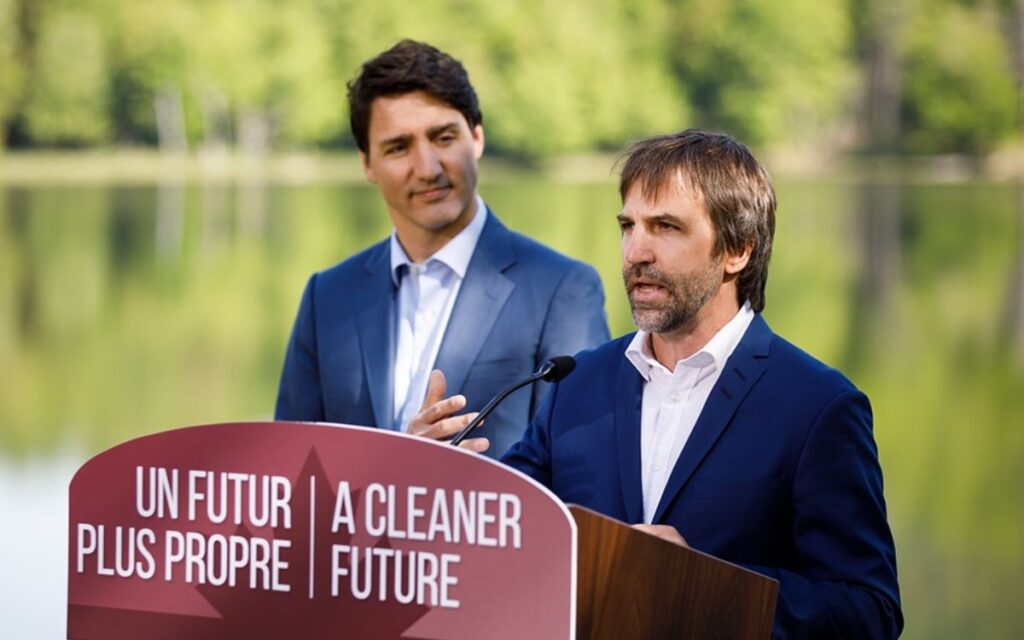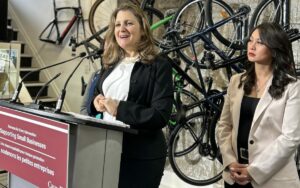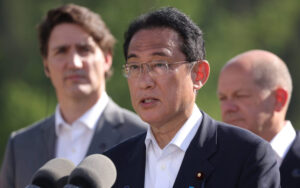
The Trudeau government will continue with its charade that it is reducing emissions, and their carbon pricing rebate is benefiting Canadian families. Photo Credit: PMO.
Canadians are mere weeks away from the federal government once again hiking the carbon tax on gas pump prices and home heating fuel. The debate on the need to increase this tax escalated this week with the Conservatives taunting Prime Minister Justin Trudeau to call a “carbon tax election.”
On April 1 the Trudeau government will increase its carbon tax by 23 per cent, an additional three cents per litre on gas and three cents per cubic metre of home heating fuel. Canadians will be paying a total carbon tax of 18 cents at the pump and 15 cents per litre for home heating. That is the tax at source, but not taking into account the hidden tax Canadians pay producers and manufacturers, transport businesses, and retailers, all who pass along the carbon taxes they incur to consumers.
With an increased number of Canadians feeling great financial strain, the opposition to the Liberals’ tax increase has grown. This past week the Liberal Premier of Newfoundland and Labrador, Andrew Furey, was the latest provincial leader to urge Trudeau to pause his scheduled carbon tax increase. Six other provinces have spoken out: Nova Scotia, New Brunswick, Prince Edward Island, Ontario, Saskatchewan and Alberta.
In what has been a vocal war of words between federal and provincial politicians, the line of the week goes to Ontario Premier Doug Ford who was addressing a convention of grain farmers when he said of the carbon tax: “You know all it does is gouge people. I don’t know what the guy (Trudeau) is smoking up there, but (the tax) is not beneficial. It hurts people, everything from transporting goods from point A to point B, (to) going to pick your kids up at a hockey game or sports facility.”
In Ottawa, Conservative Leader Pierre Poilievre spent the week attacking the Liberals on their planned tax hike. Poilievre put Trudeau on notice that if the government did not suspend its tax hike, the Conservatives would introduce a government non-confidence motion in the House of Commons. In a made-for-media address of the Conservative caucus on Wednesday, Poilievre forewarned the Liberals: “If Trudeau does not declare today an end to his forthcoming tax increases on food, gas and heat, then we will introduce a motion of non-confidence in the prime minister and call for the House to be dissolved so that Canadians can vote in a carbon tax election.”
Poilievre stated, “We are not going to put up with it anymore. We as common-sense Conservatives are saying no to Trudeau’s 23 per cent April Fool’s Day increase.”
But, on Wednesday afternoon in the Legislature the Liberal, NDP and Bloc Quebecois MPs defeated a Conservative motion to halt the tax hike by a vote of 205 to 119.
With that the Conservatives prepared a motion that reads “that the House declare non-confidence in the Prime Minister and his costly government for increasing the carbon tax 23 per cent on April 1, as part of his plan to quadruple the tax while Canadians cannot afford to eat, heat and house themselves, and call for the House to be dissolved so Canadians can vote in a carbon tax election.”
In Question period Poilievre and Trudeau exchanged barbs on the subject. The Conservative Leader questioned: “Why don’t we end the debate and let Canadians decide in a carbon tax election?” Trudeau retorted: “An election on the price of pollution? We had three of them and we won them all.” To which, Poilievre said: “Well, he shouldn’t be afraid to have one more. If he really believes in it — why doesn’t he call a carbon tax election now?”
The political rhetoric in parliament is but an echo of the last six months where Poilievre has been speaking to sold-out audiences across the country on an “Axe the Tax” tour. The Liberals have been forced to begin to defend the carbon tax as it remains the central measure (some say only measure) of their green plan to reduce emissions. According to Liberal policy backgrounders, the carbon tax is specifically designed as a punitive consumer tax to increase the cost of fossil fuels and encourage consumers and businesses to pursue cleaner, greener alternatives. The Liberals like to say it is “Canadians’ price on pollution.”
These past few weeks Trudeau introduced a new defensive argument stating that their carbon tax pays for a tax rebate that helps families with inflation and cost of living expenses. Trudeau appeared earnest in saying: “It’s about being there to support Canadians during this affordability crisis and the Canada Carbon Rebate helps out 80 per cent of Canadians with more money than they pay in terms of a price on pollution.” He called the carbon tax and its rebate system “basic math.” In Question Period, he attacked Poilievre by stating: “The leader of the Opposition wants to take away those Canada Carbon Rebate cheques from Canadian families.”
Trudeau’s absurd basic math is refuted in a detailed review within a Parliamentary Budget Officer Report that concludes: “When both fiscal and economic impacts of the federal fuel charge are considered, we estimate that most households will see a net loss. Based on our analysis, most households will pay more in fuel charges and GST—as well as receiving slightly lower incomes—than they will receive in Climate Action Incentive payments.”
Still the Liberals insist their carbon pricing system is the lynchpin mechanism to ensure the country meets its net-zero targets. However, this rationale has been discredited by government-appointed Environment and Sustainable Development Commissioner Jerry DeMarco who has concluded the Trudeau climate plan is a failure. In a program assessment, DeMarco cites the Liberals’ environmental policies have too many unrealistic assumptions and projections and have no cohesive plan to reach the targets set for 2030 or 2050. He concludes the “punitive tax approach” has not been effective and it has failed the government’s stated objective, given emissions have risen over the past couple decades.
In fact, government statistics reveal that, since 2015, Canada’s emissions have risen, and the country has the worst performance of any of the G7 nations when it comes to greenhouse gas emissions. According to the most recent U.N. Emissions Gap Report, Canada is set to miss its next emissions target in 2030 by 15 per cent.
But when have politicians been known to let facts get in the way of their political arguments? As the Conservatives continue to tighten the thumbscrews, the Liberals remain unfazed by the added pressure and have resorted to good, ol’ fashion name calling. Environment Minister Steven Guilbeault has called Saskatchewan Premier Scott Moe “immoral,” and he accuses Poilievre of being “a liar.” Trudeau says of Premier Furey that he has just “bowed to political pressure” and calls the other premiers “short-term thinker politicians.”
Meanwhile, Conservative MP Leslyn Lewis uncovered that a World Economic Forum (WEF) environmental report that said countries should establish a carbon tax to fight pollution, was actually paid for by the Trudeau government. Canadian taxpayer money totally $493,937 paid for the WEF report – a document that has been flaunted at one time or another by Trudeau, Guilbeault – and Chrystia Freeland, Mark Carney and Catherine McKenna as proof positive their carbon tax was of sound public policy. (The fraud revealed by MP Lewis has been simply ignored by the government-sponsored legacy media).
And so it goes. The political rhetoric this week seems all for naught. The Conservative’s non-confidence motion is expected to fail given the NDPs and Liberals united front. April 1 will usher in yet another tax hike at the pump and with home fuel. The Trudeau government will continue with its charade that it is reducing emissions, and their carbon pricing rebate is benefiting Canadian families.
And Canadians are left to cope through the hard times knowing, all political rhetoric aside, the Liberals’ carbon tax is just another tax.

Chris George is an advocate, government relations advisor, and writer/copy editor. As president of a public relations firm established in 1994, Chris provides discreet counsel, tactical advice and management skills to CEOs/Presidents, Boards of Directors and senior executive teams in executing public and government relations campaigns and managing issues. Prior to this PR/GR career, Chris spent seven years on Parliament Hill on staffs of Cabinet Ministers and MPs. He has served in senior campaign positions for electoral and advocacy campaigns at every level of government. Today, Chris resides in Almonte, Ontario where he and his wife manage www.cgacommunications.com. Contact Chris at chrisg.george@gmail.com.




















